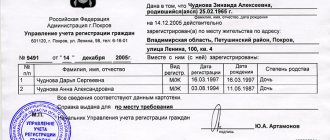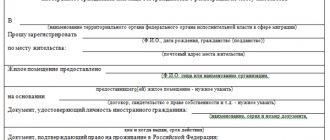Why temporary registration is dangerous for the owner, whether a registered tenant can lay claim to your home, what rights he has and what to do if a conflict arises with him, you will find out in this article.
In modern legislation of the Russian Federation, there are two terms that have replaced the outdated concept of “registration”:
- temporary registration at the place of stay;
- permanent registration at the place of residence.
Most often, temporary registration is forcedly required in the following cases:
- when preparing various documents;
- for execution of loan agreements;
- when placing children in child care institutions;
- to apply for a job in another city;
- when visiting medical institutions;
- if necessary, obtaining social benefits.
There are quite a few reasons, but the registration procedure at the place of residence, legalizing the resident, most often helps to avoid problems with the legislative framework. The only exception is if the citizen lives in close proximity to his place of permanent registration.
Deregistration at the place of residence is not provided for when registering temporarily. A certificate is issued in the form of a certificate, which has legal force only upon presentation of a passport. The certificate is issued for a certain period, adopted by mutual agreement of the owner and tenant.
The deadlines can be any, and they can be extended if necessary. This permit allows you to avoid fines for violating the law, confirms the right of residence, but excludes the right to dispose of housing.
Upon expiration of the temporary registration period, the citizen will be deregistered automatically. In this case, there is no need to contact the Federal Migration Service. If the tenant leaves ahead of schedule, then an application for deregistration must be written to the passport office.
Risks of temporary registration for the owner
Despite the fact that the right of ownership is well protected by the laws of Russia, there are certain dangers for the owner of a living space when registering on a non-permanent basis:
- if the apartment does not have appropriate metering devices, then utility bills will increase several times;
- until the contract expires, purchase and sale transactions will not be possible;
- when preparing documents using mail and online services, there is a risk of completing a transaction without the consent of the owner;
- there is a possibility of residents refusing to voluntarily vacate the occupied premises, as well as their immoral behavior;
- there may also be a risk of residents using the provided premises for other purposes, causing property damage to the owner’s property;
- residents' reluctance to pay utility bills;
- the likelihood of subletting the apartment.
The right to own housing will not pass to another citizen only upon registration, therefore registration at the place of residence will not give him the right to claim a share in the apartment. Despite this, when drawing up a residence agreement under the terms of temporary registration, you need to take into account all the subtleties and nuances of this procedure.
How long to wait and how much to pay
If a person brings all the documents to the passport office or to the territorial division of the FMS, then registration takes no more than three days. If, for example, there is no certificate of ownership or use of residential real estate, then decision-making authorities will have to spend time verifying ownership. This usually takes another 3 days.
If parents already have registration, then formally their children should be registered free of charge. Problems arise when parents want to register their children at a different address. This is usually necessary in order to assign children to the right kindergarten or good school. In this case, the services of intermediaries and homeowners who consent to registration are paid.
Pitfalls when registering children
The current legislation of the Russian Federation obliges children to be registered at the place of registration of their parents, regardless of the permission of the owner of the residential premises. Therefore, temporary registration of minors can have negative consequences for the homeowner.
A citizen can register his child for a time exceeding the period of his registration, which is quite likely to happen both due to the lack of regulations governing the standards for registering children, and due to the inattention of migration service employees. As a result of such an error, the parent can, through the courts, re-register at the address where the child is registered. Selling, donating, or re-registering in some other way an apartment in which children are registered is very problematic, especially if it is rented for a long period without carefully spelled out conditions for early cancellation of the contract.
If the parents do not have another registration, it will be problematic to register them and the child in the future. At the first consideration of the case, the court may refuse to discharge, citing the fact that in this case the child will remain on the street.
To avoid such a situation, before the registration procedure it is necessary to find out about the existence of minor family members of the person being registered. If registered residents have a child, it is advisable for the apartment owner to be personally present at the migration service office in order to be able to track the dates of registration of the children and their parents.
Why is it needed?
In relation to minors, temporary registration for a child is necessary, as for adults, in order to receive full medical care .
In addition, at present, in educational institutions of various levels, cases of requiring documents confirming registration to admit such minors have become more frequent. For example, to a kindergarten or school. The only exceptions are educational institutions of vocational education at the secondary and higher levels.
In addition, such registration is also necessary so that the migration registration carried out within our state is more complete (which is necessary for a sociological study of the situation in the country).
For more information on whether a minor child needs registration and how to register him before the age of 14 and after, read here.
Dangers of registering foreigners
Any foreigner who comes to Russia for more than a week is required to register at the place of stay. Violation of this law entails serious administrative penalties ranging from fines to deportation from the country for up to five years.
According to the rules of the migration service, issues of registration at the place of stay are dealt with by the party receiving guests from abroad. Refugees, after receiving the status of forced migrants from the Federal Migration Service or the migration departments of the Ministry of Internal Affairs, register on a general basis.
Homeowners who register foreign citizens in their homes expose themselves to a certain risk.
In any conditions, they will remain the owners of the apartment, but several unpleasant moments may well happen:
- Firstly, in addition to the previously mentioned problems, such as increasing the rent, the inability to sell the apartment, and the registration of minors in the living space, the owner faces the risk of administrative liability for failure to provide information about registered foreigners to the migration authorities. Moreover, this applies to foreign citizens both from near and far abroad countries.
- Secondly, an administrative penalty will be imposed in the event of filing false information about the registration of foreigners, that is, if the registered foreign nationals do not actually live in the specified living space.
- Thirdly, having registered a citizen of another country in his living space, the home owner begins to bear civil liability to third parties, in particular neighbors, in the event of damage to their property.
Thus, registration, informing authorities, and monitoring of residence fall entirely on the shoulders of the owner, and he bears full administrative responsibility for the following points:
- providing information to the migration service authorities about the arrival of a foreign citizen;
- reporting to control authorities about the movements of a foreign citizen;
- control over compliance with the rules of residence;
- settlement of arising property conflicts with third parties.
For this reason, it is recommended that homeowners conclude a contract of civil liability insurance to third parties or take out insurance for the premises themselves. The cost of these expenses can be included in the rent.
Required documents
What documents are needed for this? There are only two main documents:
- an application filled out by the legal representatives of the minor on his behalf;
- identification document.
The identification document is a birth certificate (up to 14 years old) and a passport of a citizen of the Russian Federation (from 14 to 18 years old).
The document must contain a mention of the minor’s citizenship.
This is either a stamp on the back of the birth certificate, or an entry about the son/daughter in the passport of one of the representatives. If the child permanently resides abroad, then you need to provide a foreign passport .
Rights and obligations of a temporarily registered resident
The rights of citizens registered temporarily are similar to those they receive at their place of permanent registration:
- the right to be present and live in this area;
- register your underage children at this address without the consent of the owner and other interested parties.
However, these citizens do not have an independent right of use, since the owner of the apartment bears responsibility for their actions, and therefore temporary residents have responsibilities:
- use the provided premises strictly for its intended purpose;
- maintain its appearance and integrity;
- respect the rights and interests of neighbors;
- adhere to fire safety, sanitary and environmental requirements;
- voluntarily move out of the apartment after the expiration of the period of residence.
Owner's responsibilities
According to the laws of the Russian Federation, the owner of a home has the full right to provide his premises for residence to other persons, but at the same time he is obliged to ensure that they have registration at the place of residence.
If the owner interferes with this, the consequences for him may be as follows:
- administrative punishment in the form of a fine;
- application of a citizen living on the basis of a lease agreement to the court to obtain permission for temporary registration;
- self-registration by the employer with the Federal Migration Service on the basis of a rental agreement.
Such liability can be avoided only if those living in the apartment have permanent registration in a given city or are close relatives of the owner of the property.
Separate from parents
Is it possible to temporarily register a child without parents? temporarily register a child without parents only when he or she reaches 14 years of age . From this moment the citizen enters into the rights of limited legal capacity.
This means that he can, at his personal request, live in any place , but subject to obtaining the consent of one of the parents.
Are children registered temporarily with the consent of one of the parents, for example, only the mother? Some FMS employees make illegal demands to obtain the consent of both parents .
There is no such requirement in the Registration Rules, which means that a child can be registered temporarily in the presence and with the consent of one of the legal representatives.
For a temporary type of registration separately from their parents, the teenager must contact the FMS or MFC together with their parents and write an application. The mother or father accompanies the child and writes a statement of consent for his temporary registration.
A child can register separately from his parents only in the living space of a close relative . The relationship with this person will need to be documented. Registration with a stranger is only possible for a teenager over 16 years of age who has undergone the emancipation procedure.
Rent amount
An increase in the amount of utility bills during temporary registration is determined only by the presence of individual water, gas and electricity meters. If there are no meters, then the calculation is made in accordance with the standards, which are multiplied by the number of residents registered in a given residential area.
The following categories are not tied to the number of people living in the apartment:
- payment for heat energy;
- housing maintenance;
- waste removal and disposal.
The cost of these services is calculated from the total area of the housing. If the apartment is equipped with metering devices, then the increase in rent will depend only on the meter readings.
To avoid misunderstandings, payment issues must be discussed with residents in advance, since temporary registration and utility payments are directly related to each other.
Difficulties in eviction
Temporary registration is not the official place of residence of a person, it is just registration at the place of actual residence, which automatically terminates upon expiration of the period prescribed by the migration service. Therefore, the owner of the property should not have any difficulties with eviction.
If the period has expired, and persons registered on a non-permanent basis are not evicted, the owner has every right to resolve the issue by applying to the courts of general jurisdiction at the location of the disputed property. If the court finds that the period has indeed expired and the tenants are occupying the premises illegally, forced eviction will be applied to them.
Temporarily registered minors and incompetent persons are evicted on the same grounds.
Grounds for forced eviction of a tenant
In cases where the registration period has not yet expired, but it is necessary to evict the tenant, it is enough to submit an application to the FMS, where it is necessary to indicate the details of the applicant, documents confirming his rights to the apartment, details of the person to be discharged and the reason why the citizen needs to be discharged.
Reasons for deregistration may include the following circumstances:
- a court decision on deprivation of liberty, immediately after the citizen’s sentence comes into force, can be removed from the registration register;
- after a court decision declaring a person dead or missing has entered into force;
- eviction from housing by court decision;
- registration at another place of residence;
- providing false or forged documents;
- violation by residents of the rules of residence.
Submitting an application through State Services
How to temporarily register a child via the Internet? Currently, any registration is possible by preliminary remote submission of an application . To do this, registration on the State Services portal is required.
After registration, the citizen receives a login, password and electronic signature, and government services become available .
The documents required for the procedure are scanned and uploaded to the “FMS Services” . An application form is also filled out there, indicating the address, registration deadlines and a list of attached documents. The system will inform you that the form has been filled out correctly and will indicate possible errors. Once the form is filled out correctly, the application will be accepted. When the registration document is ready, an invitation to receive it from the FMS will be sent to your email address.
Parents or children will be able to pick up the completed document within three days . You need to visit the FMS on time, otherwise the application will be canceled and will need to be submitted again.
Resolution of controversial situations
The practice of court cases shows that there have been no cases of loss of property rights due to temporary registration of residents; all controversial issues are resolved by the courts in favor of the owner of the property.
All complex controversial issues that arise when solving housing problems are resolved in court. Full ownership of the living space belongs to the owner, and he has the right to decide issues of registration and deregistration at his own discretion.
Most often, appeals to the courts regarding registration at the place of residence occurred for the following reasons:
- disagreement to voluntarily vacate the premises;
- behavior of residents that violates the rules of residence;
- refusal to pay utility bills;
- registration took place without the consent of the owner;
- if there are controversial issues regarding the timing of registration.
The last two reasons may arise when sending an application to the FMS by Russian Post or using electronic services. Other situations require the presence of the owner during registration, who in this case can control the designation of the registration period noted in the application for registration at the place of stay.
To avoid controversial situations and judicial red tape, you must adhere to several rules:
- be vigilant and check with all possible sources the people for whom registration is being issued;
- study the legislative framework, all the intricacies of concluding contracts;
- It is imperative to conclude a lease agreement, preferably for a short period, in order to avoid unpredictable situations.










